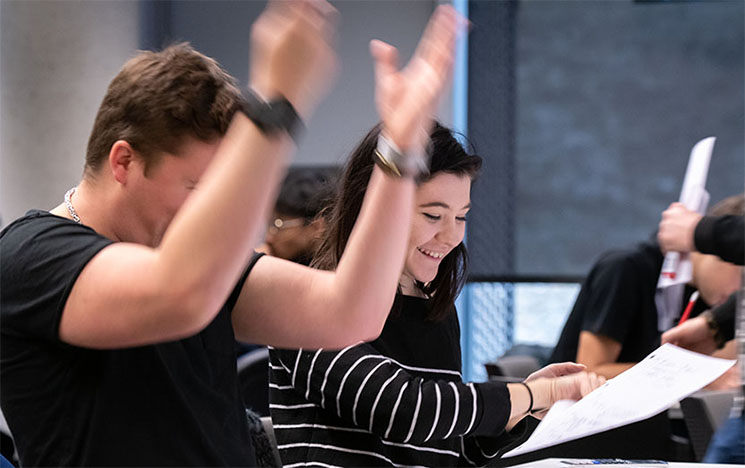What to do with a Mathematics degree
Explore the careers you might be interested in going into after studying a Mathematics degree.

What can you do with an undergraduate Mathematics degree?
Mathematics students can go into a number of career areas, including engineering, finance, IT and business consultancy.
If you decide to study at Sussex, you can choose from a range of modules and use industry-standard software such as MATLAB, Python and R.
Already at Sussex? Visit our careers site.
What jobs can you get with an undergraduate Mathematics degree?
Jobs may include, but are not limited, to:
- statistician
- actuarial or data analyst
- software or sound engineer
- investment analyst
- chartered accountant
- data scientist
- game designer
- CAD technician
- financial trader
- software tester
- teacher.
If you haven’t studied a degree yet and you’re considering a Mathematics course, you may want to browse our:
What do our Mathematics graduates do?
Recent Mathematics graduates from Sussex have gone into careers including:
- actuarial pricing analyst, Canopius
- analytics consultant, Capgemini Invent
- assistant pricing and planning manager, Volkswagen Financial Services
- assistant project accountant, BAE Systems
- audit and assurance, PricewaterhouseCoopers (PwC)
- business development manager, CCS Prepay
- data analyst, Kubrick Group
- data scientist, IG
- head of quality assurance, Fusion GFX
- specialist risk manager, Lloyds Bank.
Some of our graduates have also gone on to study for a PhD or teaching qualification.
(Department of Mathematics career database)
I work in corporate banking, dealing with trading and businesses. The analytical skills I gained during my degree are crucial in my job.”MARIANNE THOMPSON
Mathematics BSc graduate
Business Associate, Clydesdale Bank
Skills
You’ll develop knowledge and skills highly valued by employers:
- an understanding of the theories and techniques that underlie modern mathematics and the ability to apply them
- an analytical approach to problem-solving
- effective use of industry-standard software for analytical and modelling skills
- working independently to tight deadlines
- developing research skills to help prepare you for a career in research.
At Sussex, you can further develop your study skills by signing up for a range of workshops, tutorials and online resources.
At GE, we’re looking for confident, creative graduates who can make things happen. Mathematics graduates have the ability to analytically approach problems, find solutions and apply them.”MIRANDA LOUEY
Information Technology Leadership, GE Healthcare
Work experience and placements
You can gain work experience by doing a placement with an organisation.
At Sussex, during your degree, you can choose to apply for one of the below:
- a professional placement
- a research placement (you may be able to do a research placement if you are a high-performing student on a selected science course)
- an integrated placement if it is a requirement for a course.
This may help you gain skills and work experience before you graduate. You’ll be responsible for applying for and securing your placement. Find out more about placements and internships at Sussex.
You may also want to look for work experience opportunities at organisations, in areas such as:
- banking
- consulting
- computing
- financial services
- the Civil Service
- retail.
Recent students have gone on placements at:
- Rolls-Royce Motor Cars Ltd
- NATS Holdings
- HEFCE.
(Department of Mathematics career database)
I very much enjoyed my placement. I worked as an actuarial pricing analyst. My coding improved so much and I feel I got a great insight into actuarial roles.”AMY VAN DAMME
Mathematics with Economics (with a professional placement year) BSc
Placement at Legal & General
Employer Programme opportunities
We are a core part of the consortium, which gives us links to universities and industries across the region. SEPnet’s Employer Programme creates opportunities for our Mathematics, Physics and Astronomy students to apply for eight-week funded summer placements.
Learn more about the opportunities offered by the .
What can you do with a Masters in Mathematics?
You might want to pursue a career in any of the above jobs. Or you could think about continuing your education further.
At Sussex, we offer research (PhD) degrees in the following subject areas:
- .
You may then be able to go into an academic career, including roles such as:
- researcher
- higher education lecturer
- professor.
For more information about what to do after a Mathematics degree, see the website.
If you’re a current student, see more advice from our .